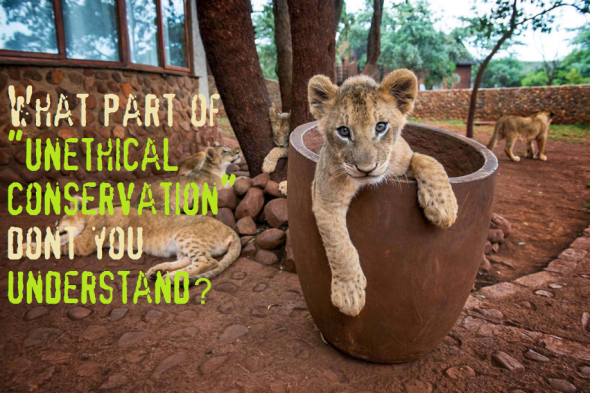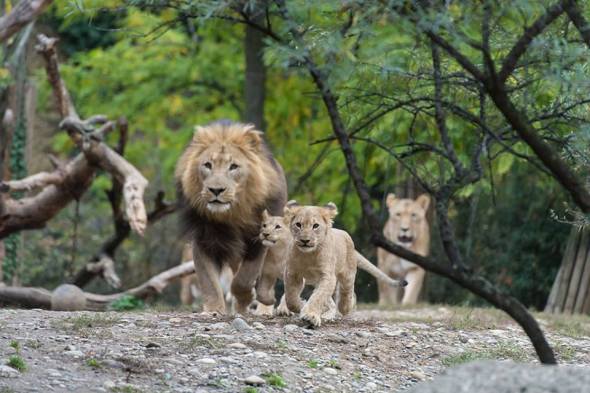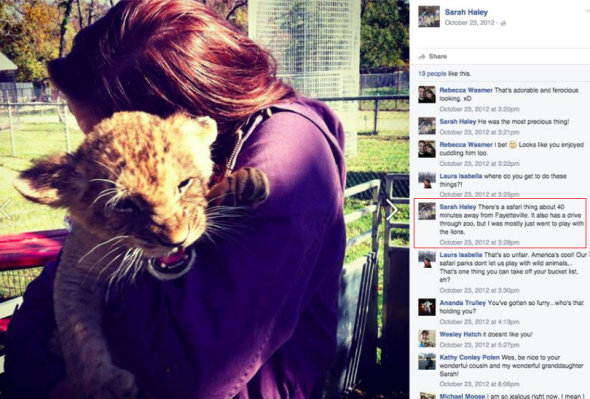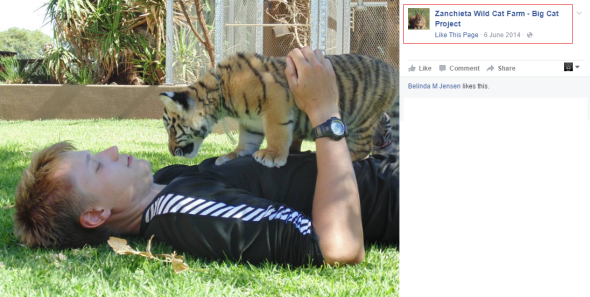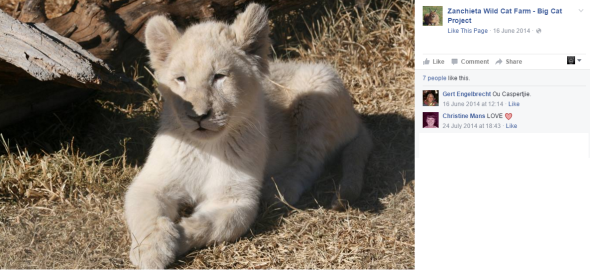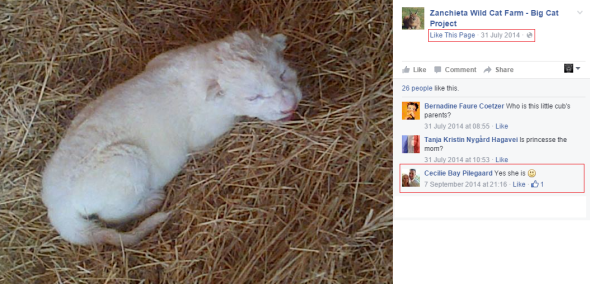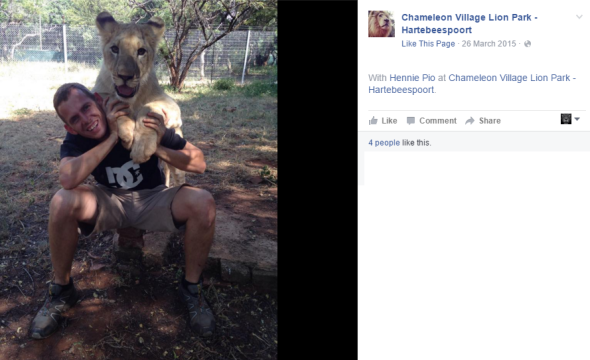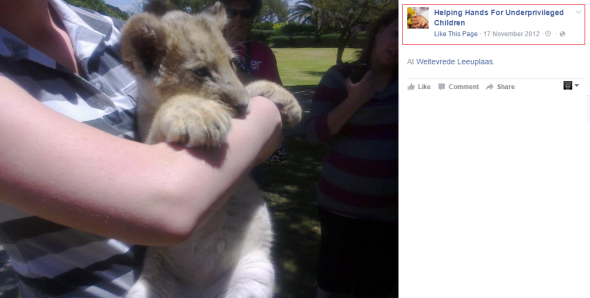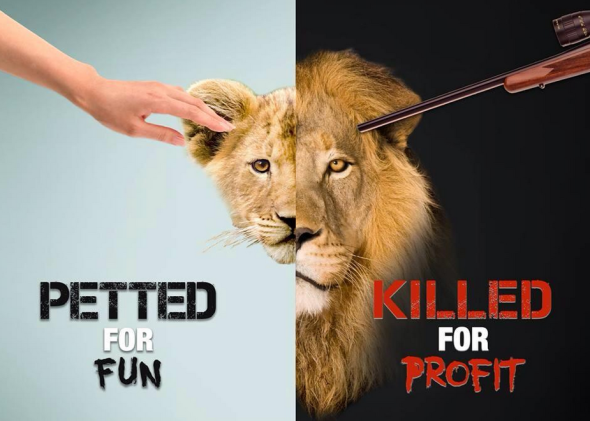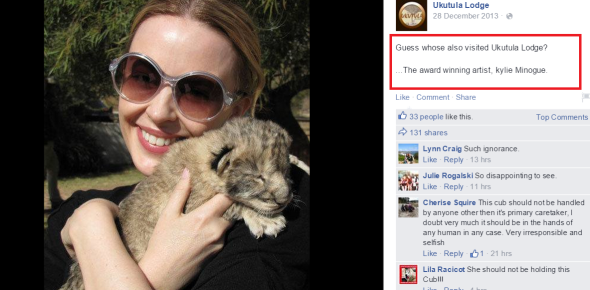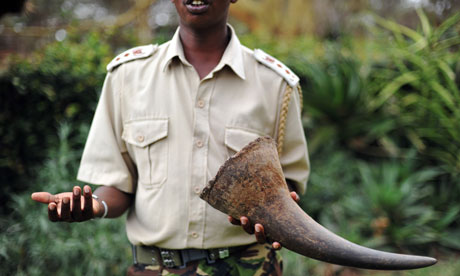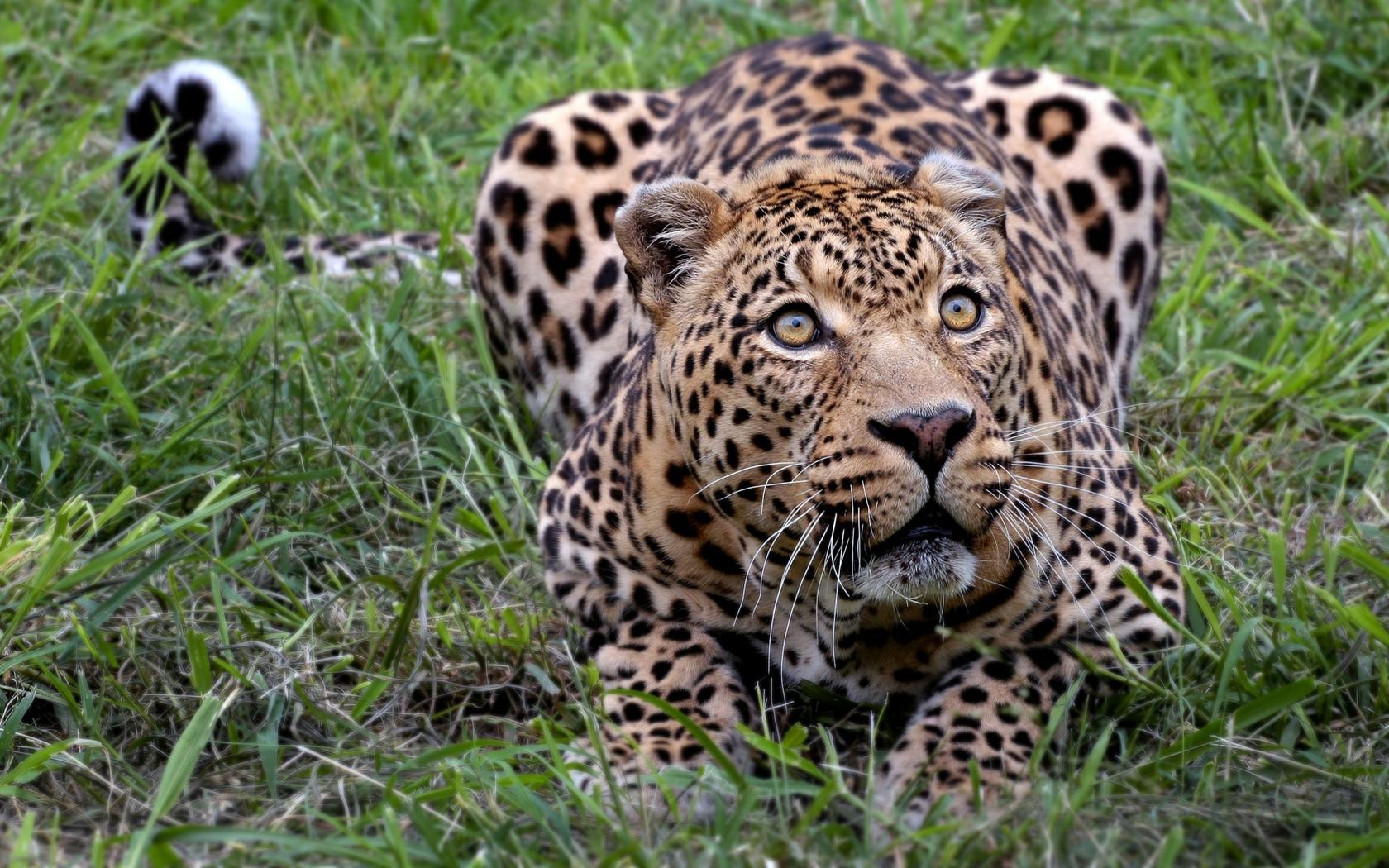What Part of Unethical Conservation Don’t You Understand? | Endangered Species Monday Special.
ETHICAL OR UNETHICAL
Last week we wrote an article in relation to the GoEco student/tourist travel firm, and the Zanchieta Wild Cat Farm. As usual we came under some pretty heavy criticism as apparently we were yet again in the wrong. Within many of the emails that we have received, students have literally blasted us for depicting themselves holding, petting or interacting with African predator cats, many of them cubs that seem to have no mother insight, and could be re-rehabilitated into the wild to boost wild predator populations up.
Back in 2015 from January to December we rolled out yet again another mass educational and awareness campaign aimed at mainly students and overseas tourists that paid up to $1,200USD for a two week visit to the many petting farms, lodges and resorts on the African continent, that was projected onto our main Facebook platform.
I.A.R.F.A’s educational and awareness campaign (2015) saw over 200 students give up this practice (one of many articles you can read here). Furthermore Zebula Golf and Spa Club that was hosting lion petting activities withdrew the practice, and removed adds from their main website. An African zoological garden removed its advertisement for cheetah petting, thus later ending their petting experiences, and finally a painter and artist that was promoting such activities eventually stopped.
The campaign also saw a decline in profit in relation to the Ukutula Game Lodge, and customer star rating, and less students visiting from 2014-2015. Amanzi Travel located within the United Kingdom have also allegedly withdrawn their lion petting advertisements focusing more on ethical conservation. (Amanzi Travel are still the focus of our attention though). The list goes on, and frankly we’re not going to stop until these practices are ceased immediately.
From 2014-2015 the organisation Blood Lions pounded the streets and cinemas (internationally) in relation too the petting and canned hunting industry which has seen quite a significant response from the petting and hunting fraternity too). In the wake of much controversy France has implemented an immediate ban on lion trophies being brought into the country. Now PHASA are at the throats of (Sapa, reported by Blood Lions) demanding the South African Predator Association immediately responds to the canned hunting problem that’s sparked fireworks around the globe. (See video below).
Unfortunately, despite the mass effort that we and others have placed into these projects, students, tourists, even trainee zoologists and veterinarians still thrash it out with us, believing that what they are participating in, is all good fun and doesn’t do the animal any harm whatsoever. Below are just a handful of the lame excuses that we read every week emailed to us in anger.
LAME RESPONSES FROM TOURISTS / PREDATOR PETTING
“None of these cubs were harmed and are all living a peaceful happy life”
“Your information is wrong, petting doesn’t harm the cubs, the cubs don’t have a mother, we’re helping them and their cuddly, so what!”
“Please research your information before posting my image, there is no hunting on this farm whatsoever, leave me alone”
“The image you posted of me misrepresents me, all I was doing was holding the cub for a Facebook photo avatar. I’m doing nothing wrong”.
“Lions are so cute, I can’t wait to go back again”
“They advertise release programs, and I participated in a release program within a fenced in area, none of the animals were harmed, or killed, what’s your problem?”
The above lines are just a handful of lame excuses that we read everyday from tourists, students, petting farms, and alleged predator rehabilitation sanctuaries. Furthermore no matter how much we try to explain, either in basic English or with science - the fact of the matter is this: Many students, tourists and sanctuaries fail to see the damage that they are doing, and contributing too.
Many of the students and tourists that we’ve highlighted as contributing too unethical conservation also scold us for using their images, stating that we’re misrepresenting them holding or petting a “predator cub”. So we’re going to try things a little differently. Back to basics. Below we’ve included a number of images, and under them images we’ve written a brief extract in relation to what’s wrong with each image/ real life scenario. However before we start, lets take a look at what real ethical conservation is within the “captive breeding and release industry”.
Image: Basel Zoological Gardens.
The image above was taken at Basel Zoological Gardens, and as you can see mother, father and three young cubs are happily strolling in the park on a fine late Spring day of (2015). There are no tourists, students or even the hint of petting, interaction, cuddling or manhandling on show here. Mother’s Oka and Uma gave birth to their cubs on May 28th, and June 15th (2015).
Many people may be asking, why are lions being bred and reared within a foreign non-African zoo? The answer to that is simple. Lions are listed as vulnerable (IUCN Red List population map), and while there may be many lions in countries such as South Africa where security is more tight. North and West African lions are practically extinct. Southern Africa is probably one of very few regions now on the African continent that holds more “larger populations”. Unfortunately within the past twenty years Africa has seen a staggering decrease of lion populations by over 30-50%. (See video below.)
Zoo Basel supports the Big Life Foundation, which works in the Amboseli-Tsavo ecosystem in Kenya to protect the Lions. The Zoo is also a participant in the EAZA Endangered Species Breeding Programme for African Lions. This means that every-single lion you see within a zoo that’s part of the EAZA Endangered Species Breeding Programme will eventually be released into the African wild, they’ll not be kept for photography purposes, or to interact with.
For release programme’s to be successful human interference must be kept to a bare minimal. You’ll not see any petting, interaction, man-handling or public photography exploitation going on here. EAZA’s Endangered Species Breeding Programme is what we refer to as “ethical conservation within captivity”, and there is much evidence in relation to EAZA’s working projects too.
UNETHICAL CONSERVATION PRACTICES
Below are prime examples of “unethical conservation practices”. From America too the continent of Africa you’ll not see EAZA’s Endangered Species Breeding Programme allowing this type of behavior. The reasons why you’ll not see such behavior played out within anyone of EAZA’s projects is listed below for your information in plain English.
GENERAL PETTING
Image: Sarah Haley lion petting United States
Back in 2012 Sarah Haley from Fayetteville, Arkansas, United States visited the Wild Wilderness Through Safari. Sarah’s reasons for visiting was quite simple. “I mostly went to play with the lions”. As one can see these lions are very young, and as normal there seems to be no mother or father in sight. What Sarah doesn’t realize is, the mother would have had her young ripped away from her at a young age, just so tourists and students can play petting.
Mother and cub[s] would have been left in quite an emotional state, suffering psychological trauma, and would have pined for one another. Its more or less the same behavior a new born baby and mother will play out when separation occurs. Did it make you feel good Sarah knowing that you was holding a pining mothers cub that simply wanted to behave like any normal human or animal mother?
There doesn’t appear to be any-form of breeding programme in operation at this alleged zoo either. Furthermore this cat will never be released into the wild, because all of its natural instincts have been removed by the human, and imprinted from the human onto the cub. Yet on the African continent we’ve lost over 50% of our lion populations. There doesn’t seem to be any form of hunting advertised, however we are somewhat suspicious here as to why so many cubs are being reared at this zoo, and what the so called zoo’s actual intentions are.
MISHANDLING
Image: Unidentified male at the Zanchieta Wild Cat Farm
Every month we bring into question many safaris, big cat projects, lodges and zoos. Many of them do not participate in hunting, while others are more than “questionable in relation to their mission statement and hunting”, and what they are actually projecting into the public domain (which most of the time doesn’t support their mission statement).
Furthermore contradictions from the owners in regards to their companies mission statement are rampant among such alleged rehab and non-breeding facilities. The image above seems pretty innocent, and quite adorable to most. The image was posted onto the Zanchieta Wild Cat Farm Facebook page of which the Zanchieta Wild Cat Farm has venomously protected as innocent.
Zanchieta have even gone to great lengths in the past week basically stating that were totally wrong, and everything that we’ve located in relation to their company (above and below) is more than legitimate. An insult that we did read stated: “We (Zanchieta Wild Cat Farm) know that this post by I.A.R.F. was done with good intentions, from people who, like us, love animals and fight for their rights”. We do indeed love animals hence why this article is proving wrongdoing and unethical conservation practices. I.A.R.F.A do not under any circumstances support such activities nor will we promote them either. (Please continue reading).
What the young unidentified male seems to be forgetting is that this young cub “may” have been removed from his/her mother at the prime milking age of three weeks old. PAAZAB’s Husbandry and Veterinary Guide states: The cub should also be supported under its bottom with the other hand, cubs must be supported correctly as to not injure the young developing cub. Further to this we all know that cubs aren’t exactly hygienic like their adult mothers and fathers. Regardless of how much Zanchieta Wild Cat Farm defends themselves, the images projected onto their Facebook page are clear signs of “exhibiting to profit from money”. The worst is to come.
Cubs this age want roam, explore, test their young muscles to develop coordination, and sleep for extended periods of time without interruption. They dislike being handled. While Zanchieta Wild Cat Farm states that they protect, rescue and rehabilitate, this behavior is neither protecting the cub, or (at the least) trying to rehabilitate this young cub into the Asiatic wild where the number of tigers are about 3,200 if that remaining in the wild.
Zanchieta Wild Cat Farm also hosts a number of lions identified as the (Timbavati white lions). This area of alleged predator conservation has been a great focus of concern to us, Timbavati white lions are practically extinct. There is said to be more white lions in captivity than in the wild. Meanwhile within the wild there is alleged to be no fewer than 13-20 individuals if that. So why is this predator rehab farm and rescue not helping to support white wild populations with captive breeding programmes? (See video below)
The owner of Zanchieta states via her website “I have never and never will breed or raise any BIG CAT at Zanchieta for onward selling to a third party. Our white lion pride has grown from the original male and female pair to five lions and these lions will never leave Zanchieta”. We believe this statement was written back in 2010 when the main domain and site was formed and registered.
NO THREATENED SPECIES RELEASE PROJECTS
Image: Timbavati white lion cub 2014.
Image: Timbavati white lion cub (new born) 2014.
The Zanchieta owner states: “No further natural breeding will occur as the females are on contraception programs. Our two male brown lions and our brown lioness were purchased as cubs and have never been allowed to breed. They too will never leave Zanchieta.” That statement has been on the main Zanchieta website since 2010, yet the lady is not prepared to release these lions into the wild via ethical conservation projects. Timbavati white lions are as explained (critically endangered), so this statement is very questionable.
Again where is the mother, but more importantly why is Zanchieta stating that none of her lions will be allowed to leave the farm? That’s a classical sign of unethical conservation for reasons that we do not fully understand. This lion as one can see (above) is only a few days old. Furthermore as the owner states none of the lions will be allowed to leave the farm.
If you are familiar with the sub-species of the Panthera leo krugeri, you’ll also know that their populations within the wild are dwindling. So theoretically any good “rescue and rehabilitation project” that states they’re not breeding (when they clearly are), would try to improve Panthera leo krugeri populations within the wild like EAZA’s Endangered Species Breeding Programme. So in our (expert opinion), this farm is nothing more than a breeding and captive facility. Indeed there are some release projects ongoing however as the owner states (no lions leave).
So instead students, tourists and volunteers can all help contribute to (nothing). That in our opinion is a complete waste of money, money that could be spent elsewhere on actual breeding and release projects to sustain threatened populations of predators.
ANIMAL ATTACKS
Image: Chameleon Village Lion Park
Whenever we explain to tourists and students about the petting and interaction industry, they’ll often absorb only a certain amount of information (in most cases), which is why education needs to focus more on every aspect of this industry rather than just hunting. Many Non-Governmental Organisations, and “anti hunting groups” out there, will categorically state on locating a petting/breeding farm, that hunting is the major player regarding their find. Most of the farms, lodges and sanctuaries that we’ve located aren’t actually connected to hunting whatsoever.
So when a tourist or student hears them words I.e. hunting is not ongoing, they automatically believe that all is okay, we’ve got our wires crossed, and we’re simply trying to tar the name of a farm or lodge. International Animal Rescue Foundation Africa researchers every single piece of detail on all industries and practices that we do not support practicing unethical conservation. That includes petting, disease, hunting, abuse, exploitation, and failure to keep to promises (I.e): release programmes, or helping increase threatened species in the wild.
Meet Mr Hennie Pio from South Africa. The image above looks very innocent again, and both the visitor and lioness seem pretty much laid back. Tourists need to remember that predators are like cats and dogs, they all have deeply embedded within their genes (hunting and predator behaviors). For E.g. I once owned a Springer Spaniel rescued as a puppy.
That wee dog was domesticated like any other dog into an adult dog. A few years into life and on a long walk, my pet dog jumped the lead, and naturally went after hens and chickens killing three instantly with a single bite to the neck. Yet the dog hadn’t seen a chicken or hen before, nor had she been raised to hunt. The same applies to lions, tigers, cheetahs, leopards, and jaguars Etc. Just because they’ve never hunted naturally in the wild, and had humans imprint their natural behaviors onto them, doesn’t for one single minute mean that, that animal will not attack you.
Listed below are real life captive predator attacks that left their owners or keepers, tourists and visitors with life threatening injuries or in some cases death did occurred.
WHEN CAPTIVE PREDATORS ATTACK
Jan 21, 2016 Australia: A 12 year old tiger has attacked a keeper at an Australian zoo founded by the late Steve Irwin. The incident, which took place Thursday morning at the Sunshine Coast’s Australia Zoo, left 41-year-old Che Woolcott with “significant puncture wounds” to his head and forearm, according to local media reports. He was treated at the scene before being transferred to the hospital.
Nov 29 2015 Malta: Ħal-Farrug zoo was closed by its owners after a tiger severely injures a 3 year old boy. A spokesman for the zoo said the incident happened when the two handlers were walking the “friendly” tiger, which they had raised, outside its cage since it had been slightly unwell. The tiger was lying on the floor when the incident happened. Upon seeing the animal, the boy ran towards it, prompting the tiger to raise its paws, lashing the child in the face in the process, the spokesman said.
Jun 1, 2015 Johannesburg, SA: Katherine Chappell, 29, a visual effects artist for Game of Thrones, was killed and her tour guide seriously injured in an attack by a lioness at the Lion Park near Lanseria. The two people were travelling in the car with their windows open. It’s understood a lioness jumped through the open window, biting the woman who was in the passenger seat. The driver, a tour guide, was badly injured while attempting to free the woman from the animal’s grasp. The park’s Scott Simpson said, “There was a car driving to the lion camp and the lioness came through the window and it bit the tourist. The ambulance arrived quite soon but the lady has passed away.” Three months ago an Australian tourist was bitten in the thigh while driving though the park, also with his window down.
Please view the video below which shows the worlds top ten predator on human attacks, Mr Hennie Pio is in our opinion a very lucky man, like most of the students, tourists and visitors that man-handle allegedly “friendly hand reared predators”. They’re only friendly if they want to be. When you place yourself within a predators environment your acting irresponsibly, furthermore if that animal attacks you, its very likely the animal will be shot dead.
Lastly if your lucky to walk away with minor or serious injuries its highly unlikely that your insurance will cover you, and you have very little chance of receiving compensation - because you placed yourself in that predators environment.
ZOONOTIC DISEASES
Image: Helping Hands for Underprivileged Children
While we all like to visit animal shelters, and provide a helping hand, one will find that some animal shelters and farms in the Western Hemisphere will point out to you the notices that inform you not to pick the animals up, touch the animals, feed them and always ensure that your hands are washed should you come into contact with animals. The reasons for these “polite notices” is to ensure you do not fall ill with anyone of the known zoonotic diseases that are fatal in some cases.
The organisation identified (above) as Helping Hands for Underprivileged Children is where the image above derives from (click the link above that’ll direct you too the Facebook image). The image was picked due to myself being a parent, and because I know just how easy it is for a child to unknowingly place their hands within the mouth dozens if not hundreds of times a day. The data below we do advise you take seriously.
When zoonotic diseases pass from animals to humans, pandemics can result. When a pathogen leaps from some nonhuman animal into a person, and succeeds there in making trouble, the result is what’s known as a zoonosis.
The word zoonosis is unfamiliar to most people. But it helps clarify the biological reality behind the scary headlines about bird flu, SARS, other forms of nasty new disease, and the threat of a coming pandemic. It says something essential about the origin of HIV. It’s a word of the future, destined for heavy use in the 21st century.
About 60 percent of all human infectious diseases currently known are shared between animals and humans. Nearly all zoonotic diseases result from infection by one of six kinds of pathogen: viruses, bacteria, protozoans, prions, fungi, and worms. Toxocariasis is a mild zoonosis caused by roundworms; you can get it from your dog, cat or in this case a predator. But fortunately, like your dog, cat or predator, you can be wormed. On some farms the owners lie to the public, and there is no way of telling if these animals are treated. Should the animal not be treated as the owners have advertised - your insurance doesn’t cover this either. Your unlikely to be compensated, and you could spend anything from 2 months to 1 year+ off work, or out of action.
Fore more information on zoonotic diseases in lions click the link below. here http://cbs.umn.edu/research/labs/lionresearch/research/diseases
We have deliberately left out all mention of hunting within this article, because frankly many tourists, students and visitors that visit predator farms seem to believe that if hunting is not seen as the “major problem”, then all is as explained pretty much okay. The petting and interaction industry can at times be directly related to hunting, however there are as seen above other issues that you need to take into consideration over hunting.
If you believe an image that we have posted “misrepresents you”, then just stop and think how that individual predator cat thinks about you misrepresenting them as a cuddly “pet”. International Animal Rescue Foundation Africa supports all EAZA’s breeding projects, reputable projects that do take in predators that are unable to be released into the wild, I.e: circus, rescues, domestic rescue Etc. We are able to view the lies and contradictions within each alleged rescue, lodge, farm or sanctuary and can if required go to great lengths to prove “unethical conservation practices are being played out here”, with more than sinister motives possibly attached.
This article hasn’t been written to attack, or place blame, but more point to where problems are occurring within the predator breeding and petting industry. If your allegedly rescuing, and rehabilitating then please print and practice just that. If your not breeding and have stated all your animals are on contraceptives, then keep to that promise. If you knowingly understand ethical conservation and really do plan on helping wildlife in their endemic wild, then please practice that. Please do not mislead the public into thinking that your indeed 100% ethical - as we will find you, and highlight them problems always steering the public into the correct conservation path.
If you feel that you’ve been led astray and would like to visit and participate in ethical conservation, please click the links below.
EAZA: http://www.eaza.net/about-us/vacancies/
WORKING ABROAD: http://www.workingabroad.com/projects/south-africa-lion-volunteer
PROTRACK: http://www.protrackapu.co.za/news-blog
BIG CAT RESCUE: https://bigcatrescue.org/get-involved/volunteer/
RHINO ORPHANAGE: https://www.helpgoabroad.com/volunteer-abroad/specialist-rhino-orphanage-and-rehabilitation-centre-2306/
Thank you for reading.
Chief Environmental Officer
Dr Jose C. Depre.
UKUTULA: TOURIST AND STUDENT BOYCOTT.
STUDENT AND TOURIST - BOYCOTT
International Animal Rescue Foundation Africa’s Board of Directors have decided to call for an immediate tourist and student boycott of Ukutula Lodge & Lion Park (Ukutula Lodge) situated at the address below with immediate effect. Please share this data onto all friends, family, work colleagues and, anyone that you know who’s planning on visiting the Ukutula Lodge & Lion Park (Ukutula Lodge) in South Africa:
Ukutula Lodge & Lion Park (Ukutula Lodge) please click the links below for GPS and Sites.
26 of the Farm Klipkop,
JQ411,
Brits, 0250,
South Africa
GPS UKUTULA LODGE AND LION PARK
UKUTULA WEBSITE
We the organisation please encourage all members of the public to visit TRIP ADVISER and UKUTULA SOCIAL MEDIA pages and pre-warn all members of the public and provide a ONE STAR rating not to visit this lodge. This farm lodge has categorically lied to the public, are selling animals onto to hunt, and haven’t answered a single question put to them since 2013. Today 2015 after the lodge yet again tried to fool the public into airing “a recorded and cut version of the BLOODLIONS.ORG film showing what (they want to show) Blood Lions made the following statement.
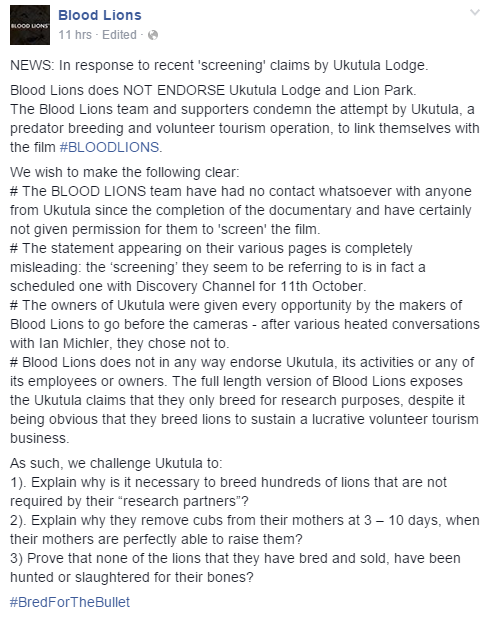
We the [organisation] have thought long and hard in relation to issuing a boycott with regards to Ukutula and their unprofessional practices operating under the guise of species research. International Animal Rescue Foundation Africa has taken in to consideration all aspects of the boycott, the implications this boycott could have on captive breeding and monetary loss. However had there not been evidence that clearly shows trade of Lions and other animals to silent partners, organisations and farms then we’d have not called for a mandatory boycott. Vasts sums of monetary income are coming into this lodge from private buyers of Lions, Cheetahs, Tigers and other animals. The farm doesn’t require funding from foreign tourists that are being lied too, brainwashed and fed misinformation, therefore a boycott must commence to shut this practice down.
Tourists and students that visit the Ukutula Lodge and Lion Park travel from the following countries: Germany; France; Finland; Holland; Denmark; Belgium; Norway; Serbia; Romania; Sweden; United States; Canada; Italy; Australia; New Zealand; Czech Republic; South Africa; Namibia; Zimbabwe; Botswana; Ireland; Portugal; Greece; Thailand; China; Vietnam; Brazil; Peru; Argentina; Mexico; Hawaii; India and Taiwan. There are likely many other countries that tourists and students are encouraged to visit too. However the vast majority are coming in from Holland, Germany, France, United Kingdom, United States, South Africa and Belgium.
Further boycotts will be called for and all boycotts with data and contact details will be posted onto our main environmental news and media site. Boycott information will be communicated to our education and youth team, as well as being communicated to all 6.1 million supporters, 400,000 of which are aligned to our Africans organisation. Any organisation or company that is aligned to Ukutula and is either promoting their services, establishment, funding their team or is actively involved in pseudo education and conservation will also fall into the international boycott too.
Environmental News and Media have identified further third parties that are actively encouraging the promotion of UKUTULA Lion and Game Lodge too identified hereto: Pieter and Brenna, Hartbeespoort and the Crafters Market of which Your Cheetah Spot company are trading images of cubs and adults to the public. We suspect that these images and other crafts sold via the company through the market via felid exploitation are providing a source of income to both the company and Ukutula. This practice is unethical and encouraging the deaths of our wildlife. The University of Pretoria are also supporting the UKUTULA Lion and Game Lodge too. We please ask that international students refrain from visiting this university that are sponsoring the work of UKUTULA. Should we locate any further companies or teaching establishments that are promoting the UKUTULA lodge we’ll be implementing them within our daily news netter ebullition and hereto on this site.
This entire game lodge is not under any circumstances teaching practical or professional conservation. What they are doing is selling animals onto silent and unknown buyers, and promoting/encouraging petting. International Animal Rescue Foundation Africa will furthermore expose tourists, students and anyone that ignores our advice and that of third party NGO’s and investigative teams.. International Animal Rescue Foundation Africa’s role is to now shut this entire establishment down. Alternatively the establishment can immediately stop their pseudo practices and continue “professional conservation” while answering our questions.
WHY ARE WE CALLING FOR A TOURIST AND STUDENT BOYCOTT OF UKUTULA?
International Animal Rescue Foundation Africa are calling for boycotts for the reasons set out hereto:
1. Promotion and interaction of felid cubs. (petting)
2. Evidence that proves cats and other animals allegedly used for research that allegedly live their life out on the grounds, being sold to private and silent buyers, organisations and farms.
3. Evidence that proves the lodge is actively involved within the hunting industry be it directly or indirectly.
4. Failure to answer straightforward and polite questions in relation to the above from ourselves, leading big cat specialists, and third party conservation organisations.
This boycott will be communicated in French, Dutch, German and Spanish. Furthermore we encourage others to please translate to your fellow friends, family, work colleagues and students.
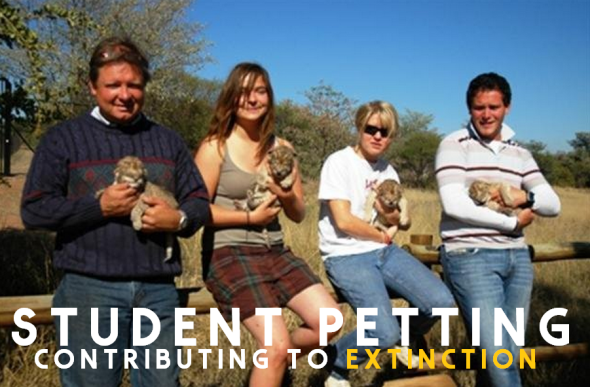
International Animal Rescue Foundation Africa will call this boycott off at anytime should we be provided with the following data.
1. How many cats from the felid family have you bred since founded?
2. How many cubs and other members of the felid family have you sold onto individual buyers, farmers, safaris, and reserves Etc. since founded?
3. To whom have you sold the above animals too under your terms for ECOSCAN? I.e. names of farms, safaris, game reserves, lodges, private hunting services, zoological gardens, individual buyers Etc?
4. Please provide any data to back your claims up that you do not support the slaughter of any animals on your farming lodge?
5. Please provide an explanation as to why you feel its necessary to remove cubs from their mothers when the mothers can rear them quite capably.
6. Are you prepared to allow independent environmental investigation officers to visit your lodge and undertake a TWO YEAR review of your scientific research, monitoring of all captive felids from the hours of 06:00am to 18:00hrs? Monday to Saturday?
7. Do you have any other land or holding facilities that are not mentioned within the public domain?
8. Are you connected to any hunting organisation, safari, reserve or other institution that promotes hunting or sustainable utilization.
STUDENT TOURIST ACCOUNT VIA BLOODLIONS.ORG
British wildlife volunteer, Keeton Hill, shares his experience and findings after his time at Ukutula farm, South Africa.
In 2013 I volunteered at Ukutula, a supposed lion conservation centre outside of Brits, Pretoria, in South Africa. For 6 months afterwards, I spoke of how great the experience was, and about how much good Ukutula were doing. Several weeks after returning from South Africa, I saw a claim that they were involved in the sale of lions for hunting. Initially, I dismissed this claim. However, after seeing more accusations, I decided to do some research to prove these claims wrong. A year and a half later, I am still yet to do so. Instead, I have only seen more and more evidence that I actually volunteered at a farm largely suspected to be involved in the canned hunting industry.
The project was booked through an agency which specialises in volunteering and working abroad. I spent 2 weeks in South Africa looking after lions. At Ukutula, volunteers were told that the lions were removed from their ‘dangerous’ parents, and hand-reared instead for their own safety. We were then told that samples were taken from the 100+ lions on the farm for research purposes, and that where possible, older lions were released into the wild.
During my two week stay, I noted several ways of doing things that I didn’t agree with. For example, there was no permanent staff member in charge of supervising the volunteers who were looking after the cubs. Upon arrival, volunteers were given a brief overview of how to care for them. As of that overview, it was up to the volunteers to decide between them who were to complete what tasks. Any authorisations or approvals were to be sought from the owners, who weren’t always available. This sometimes led to volunteers not knowing how to handle some situations, which then resulted in disagreements between volunteers. For example, some volunteers allowed young children to pet the cubs, whilst others didn’t. Some allowed guests to feed the cubs, others didn’t. There was also an occasion during which the powdered milk supply for the cubs ran out. It was a two hour wait before more was delivered. I also didn’t agree with the cubs being able to be hired for parties and events (which happened several times during my stay). Despite these things, I naively believed everything that we were told about the ‘research’ conducted at the park, and the lion ‘release’ program.
WOULD UKUTULA AND MR STRACHAN PLEASE BE KIND ENOUGH TO PROVE WHERE ALL OF THESE ANIMALS ARE NOW SHOT BY A STUDENT BACK IN 2013 IN THE VIDEO BELOW?
After the accusations against Ukutula were made, and I started my research, it became clear that these claims of releases were simply not true, and that Ukutula was far from what it made itself out to be. I realised that it operated in exactly the same way as canned hunting farms are described as operating. These similarities included a constant stream of cubs being born (there were 9 under the age of 3 months whilst I was there, with more on the way), large groups of tourists petting the cubs throughout the day, walks with older lions, and promises of the eventual release of lions into the wild (of which no evidence has ever been provided).
In order to build up a balanced and comprehensive picture about Ukutula, and find out as much about it as possible, I asked questions to a previous volunteer, a previous member of staff, and the centre’s current owner. I asked both the previous volunteer and previous staff member if they had any reason to believe that the suggestions regarding Ukutula being involved in the canned hunting industry were true. The volunteer told me that they no longer supported the centre, as they had heard several claims that lions were sold from the park (something which the centre themselves later admitted to). The staff member politely declined to comment. I then asked the current owner a series of questions, regarding why they bred so many lions, and when and where their lions are released. I was told that the centre had never claimed to release lions into the wild (which is simply not true, as myself and several other volunteers were told by the centre themselves that they do).
Since this initial realisation, it has only become more and more clear that the Ukutula lies to its volunteers and guests, has never released any lions into the wild, and that they are also more than likely involved in canned hunting. The farm admitted to moving at least 2 lions, Michael and Mandela, to zoos in the United States, and the whereabouts of several lions, such as Kevin, Kylie, Ricky, and Jenny, to name just a few, are now unknown. Attempts at finding out where these lions might be through asking members of the farms staff have proved unsuccessful, always resulting in rudely written replies, which avoid answering the question. For example, when asked the whereabouts of Kevin the lion, an Ukutula employee replied, “none of you(r) damn business”.
When I questioned the farm using an alternative email address to my own, posing as a volunteer interested in working there, they admitted that “lions are relocated in different places”. When I asked, “doesn’t that mean that the people that you send lions to could then sell them onto hunters”, the farm replied that, with a supposed “monitoring system” in the planning, this should mean that they should be “able to react to that”, but “sadly it does not mean there is a 100% guarantee”. I have also since realised that the CITES database shows absolutely no record of any lions being exported from South Africa for release into the wild in any other country. However, what it does show, is mass exports for lion trophies, lion bones, and lion skin.
I have shared my findings and opinions with any volunteers who were at Ukutula with me, and continue to attempt to inform other people who have been to the farm, as well as people that I know personally, about the canned hunting industry. Unfortunately, many previous volunteers refuse to believe about the industry, and defend the farm, often insulting or ignoring the people trying to inform them.
As the canned hunting industry is entirely legal in South Africa, creating awareness and understanding of the industry is vital, as this is one of the only ways to fight against it. The more people who know about canned hunting, the better, as this lessens the amount of unknowing volunteers who believe themselves to be doing good, which then lessens the money that these farms receive. This is why Blood Lions is so important, as it could finally be the large scale exposure of canned hunting that is needed to educate people about the canned hunting industry, as well as maybe even changing the terrible fate of South Africa’s captive-bred lions.
END OF TESTIMONY
One of the most upsetting images is that from 2013 that depicts famous singer Kylie Minouge (pictured below) petting a Cheetah cub at Ukutula that has been removed from its mother (hardly a good example to set to our children or young wildlife conservationists). Many of the students whom travel to work at this Lion and farm lodge are often told that cubs have to be separated from their mothers as the mothers are “allegedly to dangerous” and could attack or do attack the cubs.
This seemingly irresponsible advice comes from a wide range of fake conservationists that work at the facility. One in particular Mr Alan Strachan whom runs the company “Your Cheetah Spot“. Scottish born Mr Strachan that works at the Ukutula Lion and Game Lodge actively encourages people to interact with Cheetah cubs, has been witnessed man-handling the Cheetah cubs, and provides the same excuses as most staff. “The cubs are ill, cannot be released into the wild or are suffering from a wide range of tendon or ligament problems (hence why they can all walk) and look (more than healthy).
If your still thinking on visiting and taking part in the petting of cubs of which you have been told these animals are introduced into the wild. Then ask yourselves this. Why are these animals in the video below that are allegedly “so dangerous” being hand fed, and are more than tame? But more importantly can Ukutula provide evidence to back their claims up that these animals in the video below and depictions above are not dead, or ANY of the females that are sold then bred producing cubs thus not falling under “Ukutula’s ECOSCAN policy” are not then killed for the canned hunting and the trophy hunting industry? Many hunters will try and tell you that this unethical practice is helping to increase populations of Lions. So in that case please do visit the IUCN Red List and look up the Panthera Leo, can you see anywhere in this data that proves such activities are helping Lions or any cat population increases in the wild? OPEN YOUR EYES!
“DON’T BE FOOLED BY CUTENESS OR FOBBED OFF WITH EXCUSES”
Dr Jose C. Depre
Chief Environmental and Botanical Officer.
Chief Executive Officer.

